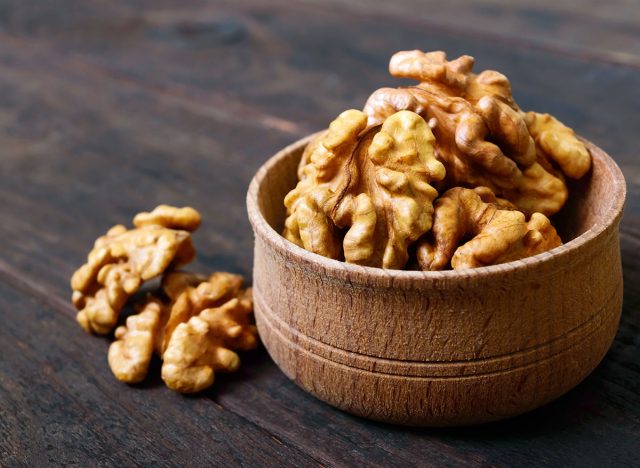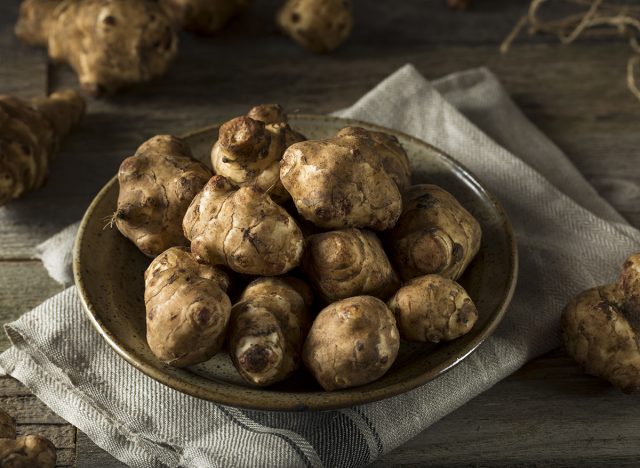3 Signs Your Gut Is Unhealthy, and 3 Foods That Can Help

You've most likely heard by now that your gut is one of the most powerful parts of your body. Experts often refer to your gut as things like "the second brain" or the "main portal" for taking in nutrients. It is vital to your overall wellbeing and research is continuing to uncover more and more ways that our health is connected to our gut.
But how can we tell if our gut is healthy or not? To learn more, we talked with our medical expert board member, Lauren Manaker, MS, RDN, author of The First Time Mom's Pregnancy Cookbook and Fueling Male Fertility, about signs your gut health may be off, as well as foods that can help us get it back on track.
Read on, then make sure to check out Gut Health Tips That Really Work.
Read the original article on Eat This, Not That!
Signs your gut is unhealthy
There are many different signs you may experience if your gut is unhealthy, but here are some of the more common ways your body may be communicating with you that something is off.
You are constantly bloated

"While there are many reasons why you experience bloat, an imbalance of the gut microbiome may be to blame," says Manaker. It's common for people with gut problems to have a higher risk of experiencing IBS—or Irritable Bowel Syndrome. One of the most common signs of IBS is excessive bloating or abdominal pain.
Make better eating choices every day by signing up for our newsletter!
You are constantly tired

"While we are still learning what the actual connection is, some evidence does suggest that those who are constantly tired may have an unhealthy gut," says Manaker, "but of course, it may also be because of other reasons, like iron deficiency anemia, stress, or simply not getting enough sleep."
A report from Sleep Medicine Reviews says that gut issues and imbalance may lead to sleep interruption or an inability to get a full night's rest, which is another way your gut can be connected to your fatigue.
You are constipated

Another way you can tell if your gut health is optimal is if you're having regular, easy bowel movements. This shows that your digestion is on track and your gut is working well.
"People should be having a bowel movement at least every three days, so if you are not experiencing this, your gut health may be to blame," says Manaker.
Foods that can help your gut
If you're experiencing some of the symptoms listed above and feel that your gut health may be out of whack, try incorporating some gut-healthy foods into your diet. A good balance of probiotics and prebiotics is a great place to start.
Walnuts

"Data shows that eating walnuts every day for eight weeks resulted in positive effects on the gut microbiome," says Manaker, "which is likely because walnuts contain fiber and evidence suggests that eating them regularly enhances probiotic- and butyric acid-producing species."
Walnuts also have a high concentration of antioxidants and omega-3 fatty acids, which make them one of the healthiest nuts out there.
Kefir

"Kefir is a fermented dairy beverage that can help colonize the gut with beneficial bacteria," says Manaker, and because of kefir's probiotic content, it's been widely used as a gut-healthy drink.
However, some people are understandably hesitant to try it if they've never tasted it before. If you're unsure about kefir but want the gut benefits, try including some in your next smoothie to hide the taste a bit more.
Jerusalem artichoke

A lesser-known food that can help you reset your gut microbiome is Jerusalem artichoke.
"Probiotics use prebiotic fiber as fuel in order to thrive in the gut, and eating Jerusalem artichokes can fuel the body with prebiotic fiber, supporting those probiotics and ultimately supporting gut health," says Manaker.
You can occasionally find Jerusalem artichoke in a specialty grocery store or look for it in products like protein bars or even healthy sodas like OLIPOP.









